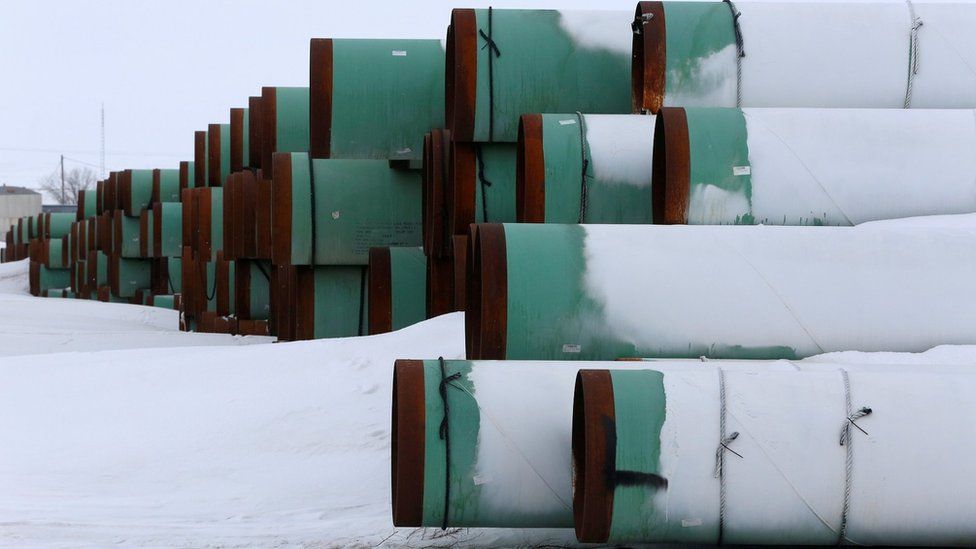Keystone pipeline: Biden 'to cancel it on his first day'
- Published

US President-elect Joe Biden is to cancel the controversial Keystone XL Pipeline on his first day in office, North American media report.
The pipeline is projected to carry oil nearly 1,200 miles (1,900km) from the Canadian province of Alberta down to Nebraska, to join an existing pipeline.
Environmentalists and Native American groups have fought the project for more than a decade.
Work had been halted but restarted in 2019 under President Donald Trump.
Mr Trump overturned a decision by his predecessor, Barack Obama, who vetoed a bill approving construction in 2015.
The privately financed pipeline is expected to cost about $8bn (£5.8bn; CAD $10bn).
What is Biden planning to do?
A briefing note seen by Canadian and US media says Mr Biden will sign an executive order revoking the permit for Keystone XL on Inauguration Day - 20 January.
He will also return the US to the Paris climate agreement - a global pact on cutting carbon emissions - reversing another decision by Mr Trump, who took the US out of the accord on 4 November last year.
Mr Biden has pledged to make the fight against climate change a top priority of his administration.
Alberta's leader, Premier Jason Kenney, said he was "deeply concerned" by the reports of Mr Biden's plans and said if the pipeline was cancelled, his government would look at legal action.
The Keystone XL pipeline would carry some 830,000 barrels of heavy crude a day from the fields in Alberta to Nebraska. From there, the oil would travel via existing pipelines to reach refineries around the Gulf of Mexico.
The pipeline would transport oil extracted from Alberta's oil sands, a mixture of sand, water, clay and a thick substance called bitumen. The oil is more expensive and energy-intensive to extract than that from conventional sources.
Environmental groups such as Greenpeace say the amount of greenhouse gases emitted per barrel of oil from the oil sands can be 30% higher throughout its life cycle than conventional oil.
However, the Canadian government says technology has created more energy efficient practices, reducing climate-damaging emissions.
Indigenous groups in northern Alberta have sued the provincial and federal governments for damages from 15 years of oil sands development they were not consulted on, saying it infringed on their guaranteed rights to hunt, trap and fish on traditional lands.
A blow to Canada's oil industry
Jessica Murphy, BBC News, Toronto
That the incoming US president opposes Keystone XL is no surprise. He was one of the voices opposing the project going back to the Obama administration, his staff said during the recent election campaign, and had pledged to "rip up" Mr Trump's approval.
But the fact that the move could come as early as day one of his presidency is still a blow to the project's supporters.
Reaction from political leaders in Canada's oil and gas heartland was swift. Alberta Premier Jason Kenney said tearing up the permits would "kill jobs on both sides of the border" and "weaken the critically important US-Canada relationship".
Canada has been lobbying for years to get the project approved and built. It is seen as critical to the future of the country's oil industry by helping deliver the product to foreign markets.
The project languished despite efforts by former Conservative Prime Minister Stephen Harper, who pushed the Obama administration to back it, fraying the relationship between the two powers. At one point, advertisements in support of Keystone XL, paid for by Canada, were splashed throughout the Washington DC metro system.
The project also has Liberal Prime Minister Justin Trudeau's support.
But while this will mean a bumpy start for the Biden administration with Canada, Mr Trudeau and Mr Biden see eye-to-eye on more environmental and climate matters than they disagree on.
How campaigners reacted to Mr Trump's decision four years ago
Related Topics
- Published21 January 2021